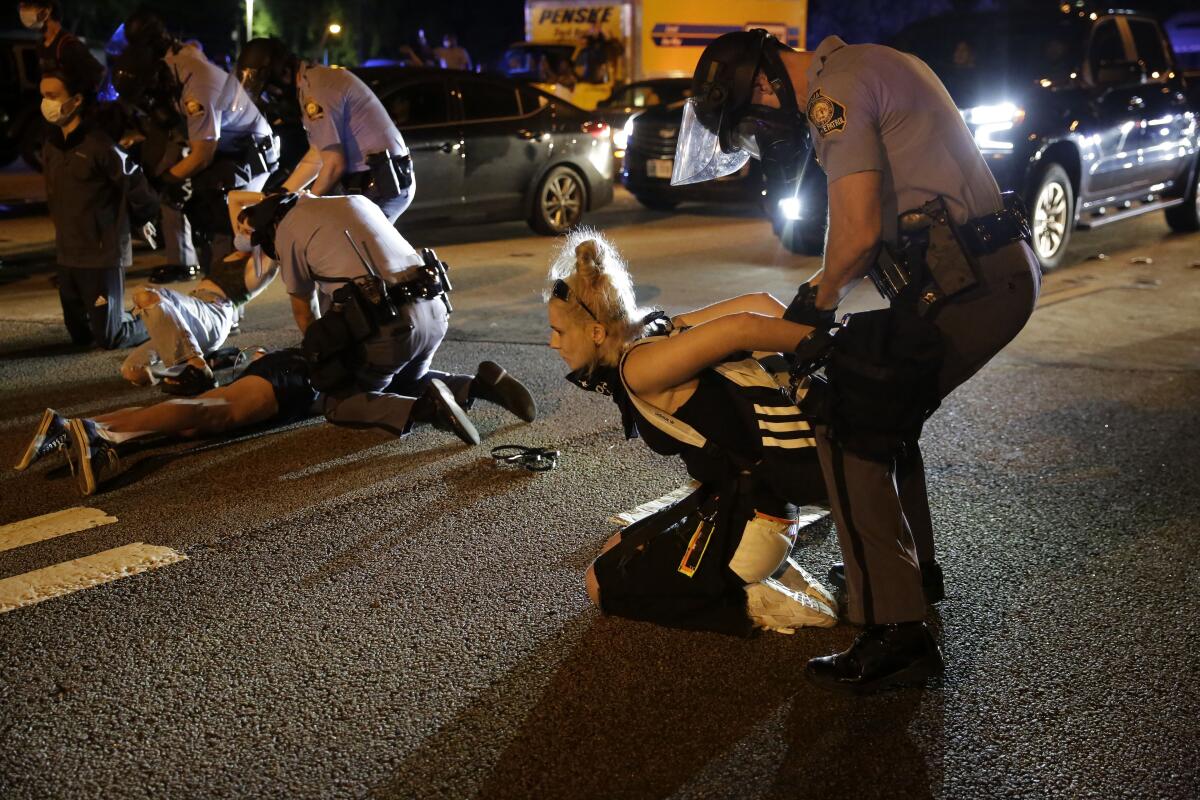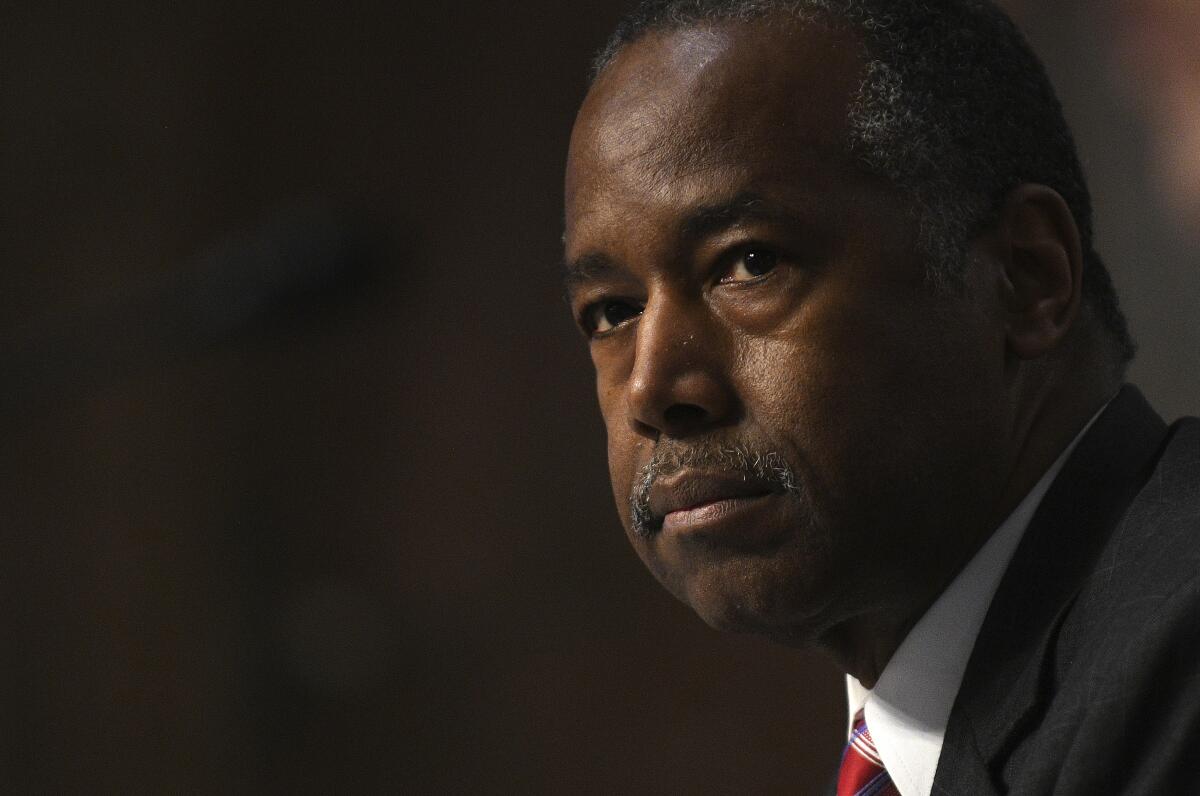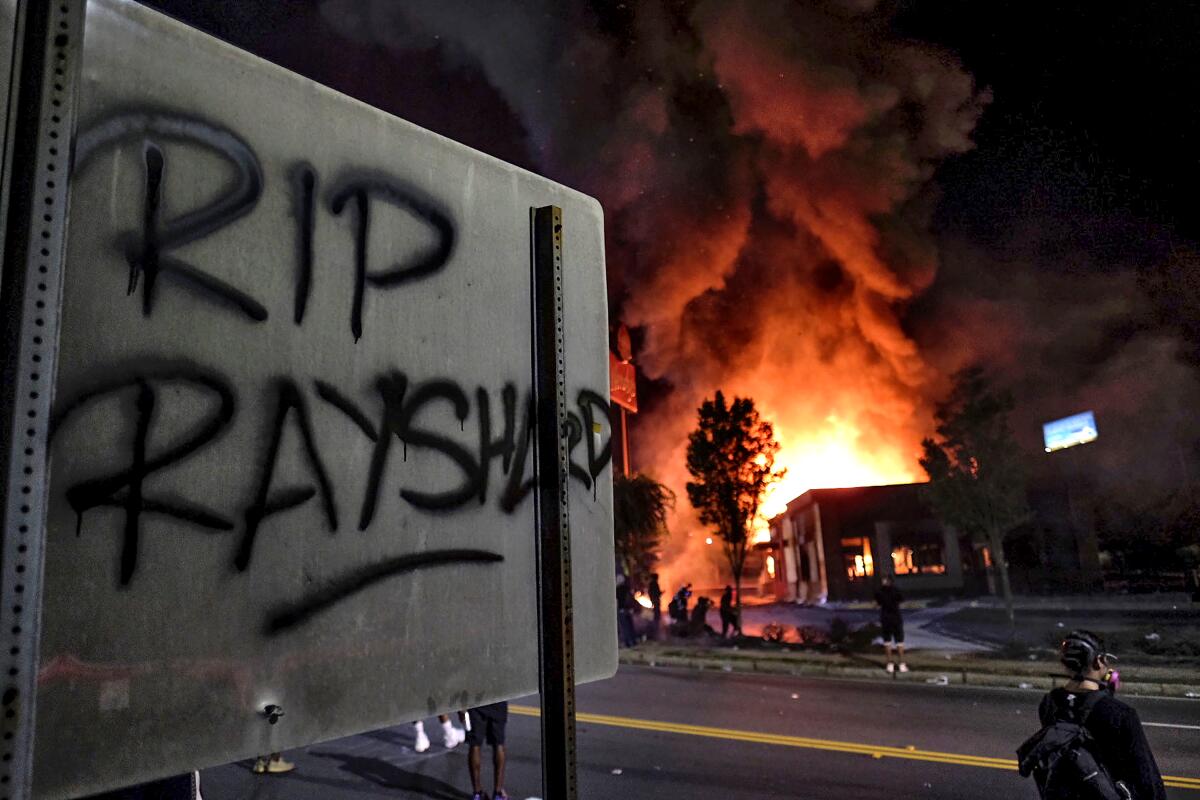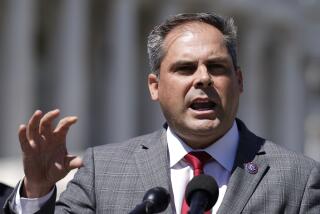Congress tackling police reform, but GOP and Democratic lawmakers differ on aims

- Share via
WASHINGTON — Against the backdrop of another Black man’s death at the hands of a white police officer, this time in Atlanta, Republican allies of President Trump clashed Sunday with Democratic lawmakers over police-reform legislation expected to be a focal point this week in both the House and the Senate.
Nearly three weeks after George Floyd’s death in Minneapolis, which galvanized the most widespread and sustained racial-justice protests the United States has seen in a generation, House Democrats are calling for a ban on police chokeholds, an end to no-knock warrants and the creation of a national police misconduct registry, among other steps.
A midweek hearing is set in the House on the Democratic plan. On the Senate side, the chamber’s only Black Republican, Sen. Tim Scott of South Carolina, plans to unveil a measure this week.
Trump, who turned 74 on Sunday, has often appeared out of step with public sentiment, with opinion polls suggesting broad support for the protests’ aims of redressing systemic racism in policing.
As marches and rallies spread from coast to coast and beyond the U.S., critics accused the president of stoking tensions with inflammatory tweets and statements, including his threat earlier this month to send in active-duty military troops to American cities.
Even so, Housing and Urban Development Secretary Ben Carson, the only Black member ever to serve in Trump’s Cabinet, said Sunday that he expected the president would “look at everything” in terms of legislation meant to curb police abuses.

“We need to look at appropriate reforms, and this is probably a good time to shine the spotlight on it and get it done,” Carson said. But he added: “Obviously we do not want to create a situation where the police are under the microscope.”
Democrats clearly hoped to build on an outpouring of sentiment in favor of greater accountability for police abuses — especially after recent weeks yielded a number of viral videos of heavy-handed actions by officers during peaceful protests.
“We are in a nation right now where the sense of what’s possible has shifted,” Sen. Cory Booker (D-N.J.) said. Interviewed on CBS’ “Face the Nation,” he said this was not the time for “lowest-common-denominator, watered-down reforms.”
“It’s a time to stop the problem, because if someone’s knee is on your neck, you can’t take it halfway off and say that that’s progress,” said Booker, a former mayor of Newark who sought the 2020 Democratic presidential nomination.
While the protests’ overall peak appeared to have passed, weekend unrest flared in Atlanta after police on Friday night shot and killed a 27-year-old Black man, Rayshard Brooks. The police chief, Erika Shields, resigned the next day, and on Sunday, authorities announced the firing of the white police officer who shot Brooks in the back, Garrett Rolfe, and a second white officer was being placed on administrative duty in connection with the shooting.

Several lawmakers said circumstances surrounding Brooks’ death appeared murkier than they did Floyd’s case. A Minneapolis police officer, Derek Chauvin, faces second-degree murder charges after video from the scene showed him pressing his knee to the handcuffed man’s neck for nearly nine minutes, while Floyd repeatedly called out that he could not breathe.
The Georgia Bureau of Investigation said Brooks failed a sobriety test after police responded to a call about a man sleeping in a parked vehicle in the drive-through lane of a Wendy’s restaurant. Brooks, according to authorities and videos, struggled with officers seeking to handcuff him after questioning him for a lengthy period of time. Authorities said Brooks grabbed a Taser during the scuffle, and video appeared to show him aiming the stun gun in officers’ direction after attempting to flee.
L. Chris Stewart, an attorney for the Brooks family, told reporters that the officer who shot him should be charged for “an unjustified use of deadly force, which equals murder.” A Taser is considered a nonlethal weapon in Georgia, Stewart noted, citing state court cases.
The attorney said Brooks, a father of four, on Friday had celebrated the 8th birthday of one of his daughters.
Authorities on Sunday announced a $10,000 reward for information leading to the prosecution of individuals responsible for setting fire late Saturday to the Wendy’s where the shooting occurred. They also said that 36 people had been arrested Saturday in protests of the shooting.
Asked whether the police had used excessive force, Scott, appearing on CBS on Sunday morning, said, “one of the challenges that we have in these split-second decisions is the need for more training.”
“I think it’s really difficult to establish a codified-in-law standard for use of force — there’s millions of scenarios that play out,” he said in a separate interview on NBC’s “Meet the Press.”
But Rep. James E. Clyburn (D-S.C.) said he was “incensed” by the killing. Clyburn, the 79-year-old House majority whip, said that even at his age, he is sometimes afraid that an encounter with law enforcement could result in death or injury.
“I didn’t grow up in fear of police, even in a segregated environment. We never feared the police. But, all of a sudden now, I do fear the police. The young Blacks fear the police,” he said on CNN’s “State of the Union.” He blamed “a structure that has been developed that we have got to deconstruct.”
Despite differences in the Democratic and GOP legislative approaches — including on whether chokeholds should be banned or simply discouraged, and setting conditions for suing police in civil courts — Clyburn said he hoped for compromise.
“I never call anything a nonstarter,” he said. “Let’s just let both houses do what they’re going to do, and then let’s get down to the serious business of reconciling our differences.”
Times staff writer Jennifer Haberkorn contributed to this report.
More to Read
Get the L.A. Times Politics newsletter
Deeply reported insights into legislation, politics and policy from Sacramento, Washington and beyond. In your inbox twice per week.
You may occasionally receive promotional content from the Los Angeles Times.










